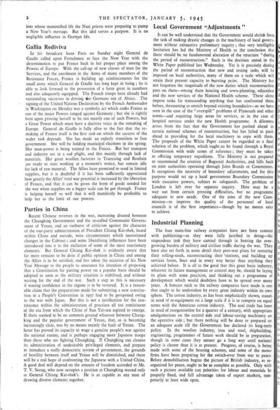Parties in China
Recent Chinese reverses in the war, increasing discord between the Chungking Government and the so-called Communist Govern- ment of Yenan, and an outburst of criticism against the character of the one-party administration of President Chiang Kai-shek, heard within China and outside, were circumstances which necessitated changes in the Cabinet ; and some liberalising influences have been introduced into it to the exclusion of some of the most reactionary . elements. But General Chiang Kai-shek is evidently aware that far more remains to be done if public opinion in China and among the Allies is to be satisfied; and has taken the occasion of his New Year Message to the people to announce his intention of proposing that a Constitution for putting power on a popular basis should be adopted as soon as the military situation is stabilised, and without waiting for the end of the war. Such a step as this is necessary if waning confidence in the regime is to be restored. It is a reason- able claim that the preparations made for submitting a new constitu- tion to a People's Convention in 1937 had to be postponed owing to the war with Japan. But this is not a justification for the con- tinuance within the administration of practices all too reminiscent of the era from which the China of Sun Yat-sen aspired to emerge. If there seemed to be no common ground whatever between Chung- king and the popular government of Yenan, that, as is becoming increasingly clear, was by no means mainly the fault of Yenan. The latter has proved its capacity to wage a genuine people's war against the national enemy, and is perhaps engaging more Japanese troops than those who are fighting Chungking. If Chungking can cleanse its administration of undesirable privileged elements, and prepare to introduce a really democratic system of government, the grounds of hostility between itself and Yenan will be diminished, and there will be a real hope of confronting the Japanese with a United China. A good deal will depend on the amount of freedom accorded to Mr. T. V. Soong, who now occupies a position at Chungking second only to General Chiang Kai-shek's. He is as capable as any man of drawing diverse elements together.


























 Previous page
Previous page